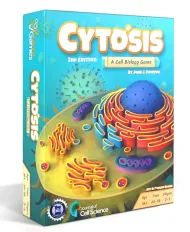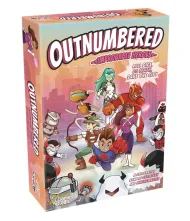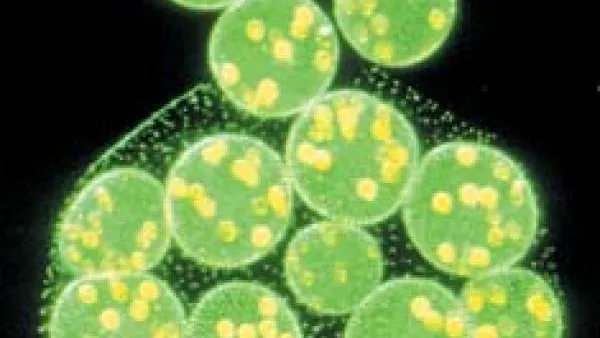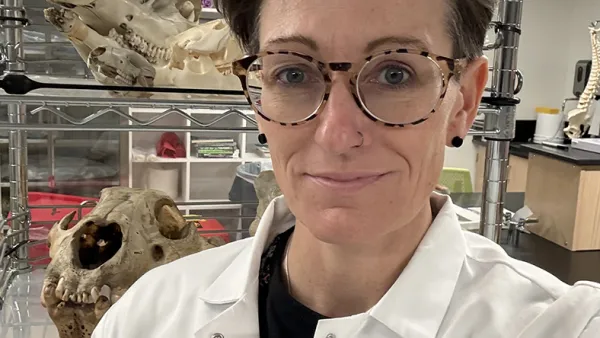John Coveyou, AB 2010 (environmental studies) and MA 2011 (engineering), is the founder of Genius Games, the leading publisher of strategy card games and board games based on real science.

His fascination with science began as a young child when he read the book How Things Work. Prior to joining the U.S. Army at age 17, he struggled academically and had a difficult life at home, barely graduating high school. He enlisted because he didn’t feel he had other options. His time in the Army taught him about hard work, discipline, and what he didn't want to be doing the rest of his life. When he returned, his education became a priority.
Getting into WashU was a pivotal moment for him, allowing him to delve deeper into the sciences. When he was accepted, it was a bittersweet moment because he couldn’t afford the tuition. Thanks to an Elizabeth Danforth Gray Scholarship from the Women’s Society, he was able to attend WashU after all. Like many, he wanted to be pre-med, but wasn’t sure if he could succeed. He’d heard that the Chemistry 101 course was a “weed out” course and thought if he could pass that, he could make it, and he did quite well!
Coveyou was deployed to Iraq after completing his first semester. That is when he really fell in love with science. He brought textbooks with him and read them cover to cover. The knowledge he gained provided solace in the middle of a combat zone, where poverty, conflict and other issues that bring people pain were always at the forefront of his mind.
“The universe is an incredible, beautiful mess. Its complexity is difficult to comprehend. People might hate each other because of where they come from or what they believe, yet our cells still work the same way. Reading those textbooks in that environment made me fall in love with science and realize how it could make a massive impact. Science can play a big role in alleviating societal issues such as resource scarcity, disease, or other widespread difficulty.” Coveyou mused.
The Path from Biology to Entrepreneurship
You might assume that Coveyou pursued a business degree or at least a business partner with experience in order to start Genius Games, but that is not the case. “It's amazing what you can learn from Google and asking people who've done it before you,” he remarked. He taught chemistry part time at St. Louis Community College while finishing his degree. He witnessed his students struggling with basic concepts and realized if he took out words like “protons, neutrons and electrons” and replaced them with “apples, oranges and bananas”, the lightbulb turned on. Suddenly the content seemed simple to learn.
It occurred to him that many of his friends who enjoy tabletop gaming were willing to memorize huge amounts of information based around Sci-Fi and fantasy themes. If he could take the chemistry and biology concepts he was teaching and convert them to game form, he could make some real progress with his students.
Coveyou decided to try his hand at creating science games and quickly learned how challenging it is, so he began going to game design clubs and making lots of games until he finally came up with a game he felt was good enough to publish. But no publishers would touch it, because they couldn’t believe that anyone wanted a game based on hard science. Ever a problem-solver, he launched his game on Kickstarter in 2014 and raised $12,000.
Over the next several years, he talked to business owners and tirelessly researched the internet reading articles about Kickstarter, game design; finding factories, freight companies and shipping companies; piecing everything together himself. He attributes some of these problem-solving skills to his early experiences with WashU science courses, which were possibly more helpful to his success with Genius Games than a traditional business degree.
Basic science courses at WashU such as Chemistry 101 and Principles of Biology I and II, focus more on the process of arriving at an answer rather than the answer itself. Biological processes don’t exist in an isolated system. Everything influences everything else through sometimes unknown mechanisms. Scientists test, probe, identify, and isolate to determine causation or correlation.
“That was an amazing skill for an entrepreneur to learn through science. ‘Don't worry about getting the right answer. Just talk about all the different ways we can solve it. Here's some solutions. What do we think is the most optimal? Great, let's go with it. Now, next problem’. And that's really entrepreneurship in a nutshell!” Coveyou explained.
Today, Genius Games has published most of their products through Kickstarter, and raised a little over two and a half million dollars launching new products, including the recent addition of jigsaw puzzles designed by a certified medical illustrator from Johns Hopkins University.
The Games and Players
Early on, Genius Games decided not to produce digital games. “We want people to be interacting face to face and not sitting in front of screens when playing our games.” Coveyou said.
There are three basic target audiences for Genius Games.
- Experienced gamers: These games are geared toward adults who have been playing games for years. The rules are complicated and these games take at least an hour or two to play. Reading the rulebook alone takes 30 minutes to an hour.
- Parents who have kids at home age 8 and up: These games are for families that want to do something fun, active, and constructive together.
- Younger kids: These simpler games are geared towards younger kids. For example, Outnumbered: Improbable Heroes is a math game about addition, subtraction, multiplication, fractions, decimals, and percentages.

Players don't need to have any scientific knowledge or gaming background to be able to play the games, however, will need to invest time and energy into more advanced games. Coveyou suggests it may be helpful to pull in a gamer who plays hobby board games regularly to help learn because they understand common gaming mechanisms.

“Experienced gamers are used to traditional fantasy and Sci-fi themes like dragons, zombies, ninjas, and space exploration, but we have something different to offer. It provides a nice way for them to bring one of their science-minded friends into a hobby that they're very interested in,” Coveyou remarked.
Unlike Uno or Monopoly where the rules are simple and quick, these games are designed to be as deeply complex and scientifically accurate as possible to hold the attention of the player. QR codes linking to rules videos can be found on the backs of all game boxes. Coveyou thinks the primary game that biology fans will be most interested in is the bestselling Cytosis: A Cell Biology Game, endorsed by the Journal of Cell Science and lauded by biologists for its accuracy.




